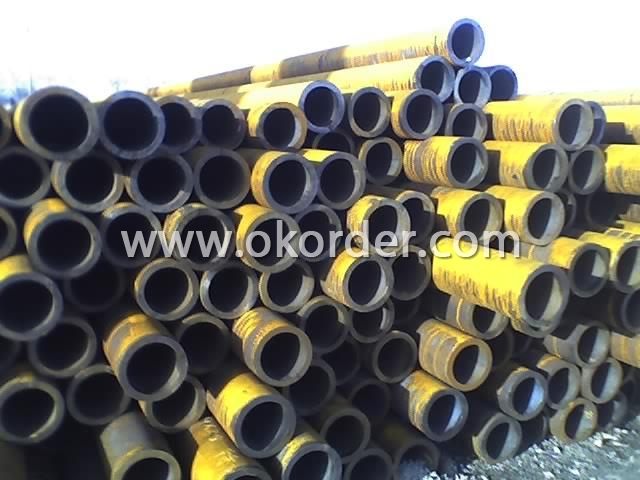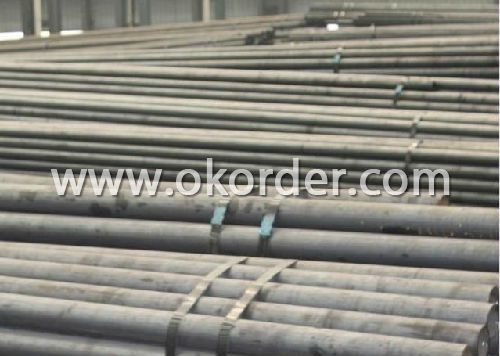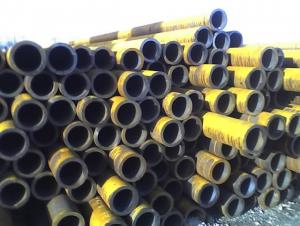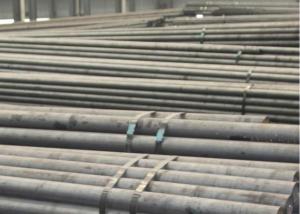High-Quality Gas Cylinder
- Loading Port:
- China Main Port
- Payment Terms:
- TT or LC
- Min Order Qty:
- 20mt m.t.
- Supply Capability:
- 5000 Tons Per Month m.t./month
OKorder Service Pledge
OKorder Financial Service
You Might Also Like
Specifications / Features of High-Quality Gas Cylinder
The company producsts including seamless steel gas cylinder
for industry and medical gas use. We can make cylinder
apply to standard of DOT3AA, JIS8241, EN1964,
ISO9809,GB5099, KSB6210. We also produce cylinder with
certificate of CCS,BV, LLODY'S, ABS.
Standard of High-Quality Gas Cylinder
GB5099
Material: 34Mn2V/37Mn/30CrMo
Nominal Diameter: 219/232/267/279/325(mm)
Water Capacity: 20-80(L)
Nominal Height: 815-1780(mm)
Nominal Weight: 30.5-103(kg)
Service Pressure: 15/20(MP)
Wall Thickness: 4.7-7.0(mm)


- Q:What are the environmental impacts of steel pipe production and disposal?
- Significant environmental impacts are associated with the production and disposal of steel pipes. First and foremost, the production of steel pipes necessitates the extraction of raw materials such as iron ore, coal, and limestone. This extraction process leads to the destruction of habitats, deforestation, and soil erosion. Furthermore, mining and processing these materials require a substantial amount of energy, often derived from fossil fuels, which contributes to the emission of greenhouse gases and air pollution. The manufacturing process itself encompasses various stages, such as melting, casting, rolling, and coating, all of which demand considerable energy inputs and emit substantial quantities of carbon dioxide and other greenhouse gases. Additionally, the production of steel pipes involves the utilization of chemicals and additives that can pose harm to the environment if not properly managed. Moreover, if steel pipes are not recycled or appropriately dealt with during disposal, they can end up in landfills, thus contributing to waste accumulation and occupying valuable space. Steel is typically non-biodegradable and can take hundreds of years to decompose. When steel pipes are dumped in landfills, they can release toxic substances and heavy metals, which can contaminate soil and groundwater. Nevertheless, it is important to acknowledge that steel pipes are highly recyclable, and recycling them significantly mitigates the environmental impact. Recycling steel pipes aids in the conservation of natural resources, reduces energy consumption, and lowers greenhouse gas emissions. Additionally, using recycled steel in the production of new pipes requires less energy and results in fewer emissions compared to using virgin materials. To minimize the environmental impacts of steel pipe production and disposal, it is crucial to advocate sustainable practices throughout the entire lifecycle of the product. This entails reducing energy consumption, utilizing renewable energy sources, implementing proper waste management strategies, and encouraging the recycling and reuse of steel pipes.
- Q:What does "buried steel pipe" 6*2SC100 mean?
- Welded steel pipe refers to the use of steel or steel plate bending deformation into a round, square and other shapes after welding into the surface of the joint of the steel pipe. The blank used in welded steel pipe is steel or strip steel.
- Q:Can steel pipes be used for scaffolding and support structures?
- Indeed, scaffolding and support structures can make use of steel pipes. Due to their robustness, longevity, and ability to bear substantial loads, steel pipes are commonly employed in the construction industry. They establish a steady and secure framework for scaffolding and support structures, guaranteeing the safety of workers and the stability of the construction undertaking. Moreover, steel pipes possess versatility, enabling convenient assembly and disassembly, rendering them a superb option for temporary structures such as scaffolding. Furthermore, steel pipes exhibit resistance to corrosion, rendering them appropriate for outdoor applications and ensuring the enduring existence of the scaffolding and support structures.
- Q:Can steel pipes be used for transporting slurry?
- Yes, steel pipes can be used for transporting slurry. Steel pipes are known for their durability and strength, making them suitable for handling abrasive materials like slurry. The smooth interior surface of steel pipes helps to minimize friction and prevent clogging, ensuring efficient transportation of slurry. Additionally, steel pipes can withstand high pressure and are resistant to corrosion, making them a reliable choice for slurry transport.
- Q:What is the maximum operating temperature for steel pipes?
- The maximum operating temperature for steel pipes typically depends on the specific grade of steel used. However, in general, carbon steel pipes can typically withstand temperatures up to 800-1000 degrees Fahrenheit (427-538 degrees Celsius). Other alloy steels, such as stainless steel or high-temperature alloys, can withstand even higher temperatures, ranging from 1200-1500 degrees Fahrenheit (649-816 degrees Celsius) or more. It is important to consult the manufacturer's specifications or industry standards to determine the exact maximum operating temperature for a specific type of steel pipe, as different grades and compositions may have different temperature limits.
- Q:What are the common factors affecting the lifespan of steel pipes?
- There are several common factors that can affect the lifespan of steel pipes. 1. Corrosion: Corrosion is one of the primary factors that can significantly reduce the lifespan of steel pipes. Exposure to moisture, chemicals, and harsh environmental conditions can cause the steel to rust and deteriorate over time. 2. Quality of materials: The quality of the steel used in manufacturing the pipes plays a crucial role in determining their lifespan. Higher-quality steel with better resistance to corrosion and other forms of degradation will generally have a longer lifespan compared to lower-grade materials. 3. Installation and maintenance practices: Proper installation and regular maintenance are essential for ensuring the longevity of steel pipes. Improper installation techniques, such as inadequate support or improper alignment, can lead to premature failure. Similarly, neglecting routine maintenance, such as cleaning and inspection, can accelerate the degradation process. 4. Operating conditions: The operating conditions to which steel pipes are exposed can also impact their lifespan. Factors such as temperature, pressure, and the type of fluid or gas being transported can all affect the integrity of the pipes. Extreme conditions, such as high temperatures or corrosive substances, can significantly reduce the lifespan of steel pipes. 5. Mechanical stress: Excessive mechanical stress, such as vibration, impact, or heavy loads, can weaken steel pipes over time. This stress can lead to cracking, deformation, or even complete failure if not properly managed or accounted for during the design and installation process. 6. Environmental factors: The surrounding environment can have a significant impact on the lifespan of steel pipes. Exposure to harsh weather conditions, such as extreme temperature variations or frequent freeze-thaw cycles, can accelerate the deterioration process. Additionally, the presence of pollutants or aggressive substances in the surrounding soil or water can also contribute to the degradation of steel pipes. In summary, the lifespan of steel pipes can be affected by factors such as corrosion, material quality, installation and maintenance practices, operating conditions, mechanical stress, and environmental factors. By considering and addressing these factors, it is possible to extend the lifespan of steel pipes and ensure their durability and reliability.
- Q:Are steel pipes resistant to impact or external forces?
- Yes, steel pipes are generally resistant to impact and external forces. Steel is known for its high strength and durability, making it an ideal material for various applications, including pipes. Steel pipes have the ability to withstand external forces such as impact, pressure, and vibrations. They are often used in industries that require reliable and sturdy piping systems, such as oil and gas, construction, and infrastructure. Additionally, steel pipes are less prone to cracking or breaking under extreme conditions compared to other materials. However, the resistance to impact and external forces may also depend on the specific grade and thickness of the steel used in the pipes.
- Q:What is the role of steel pipes in the transportation of chemicals?
- The role of steel pipes in the transportation of chemicals is to provide a strong, durable, and corrosion-resistant conduit for safely moving various types of chemicals from one location to another. Steel pipes are known for their high strength and ability to withstand high pressure, making them suitable for handling hazardous or aggressive substances. Additionally, the smooth interior surface of steel pipes minimizes friction, allowing for efficient and continuous flow of chemicals. The steel material is also resistant to chemical reactions, ensuring the integrity and purity of the transported substances. Overall, steel pipes play a crucial role in ensuring the safe and efficient transportation of chemicals, protecting both the environment and human health.
- Q:How are steel pipes used in the construction of irrigation systems?
- Steel pipes are commonly used in the construction of irrigation systems to transport water from a source, such as a reservoir or well, to the fields or gardens that need to be irrigated. These pipes are durable, strong, and resistant to corrosion, making them ideal for withstanding the pressure and frequent water flow in irrigation systems. They are often used to create mainlines, secondary lines, and lateral lines, ensuring the efficient distribution of water to different areas. Additionally, steel pipes can be easily connected and adapted to various configurations, allowing for flexibility in designing and expanding irrigation networks.
- Q:Can steel pipes be used in the oil and gas industry?
- Yes, steel pipes are commonly used in the oil and gas industry. They are known for their high strength, durability, and resistance to corrosion and high pressure, making them suitable for transporting oil and gas.
1. Manufacturer Overview |
|
|---|---|
| Location | Wuxi, China |
| Year Established | 1991 |
| Annual Output Value | 300,000Tons |
| Main Markets | Europe; Southeast Asia; etc. |
| Company Certifications | API 5L;API 5CT;API Q1;ISO/TS29001 |
2. Manufacturer Certificates |
|
|---|---|
| a) Certification Name | |
| Range | |
| Reference | |
| Validity Period | |
3. Manufacturer Capability |
|
|---|---|
| a)Trade Capacity | |
| Nearest Port | Wuxi; Shanghai |
| Export Percentage | 41% - 50% |
| No.of Employees in Trade Department | 3900-4000 People |
| Language Spoken: | English; Chinese; Spanish |
| b)Factory Information | |
| Factory Size: | Above 450,000 square meters |
| No. of Production Lines | Above 10 |
| Contract Manufacturing | OEM Service Offered;Design Service Offered |
| Product Price Range | Average |
Send your message to us
High-Quality Gas Cylinder
- Loading Port:
- China Main Port
- Payment Terms:
- TT or LC
- Min Order Qty:
- 20mt m.t.
- Supply Capability:
- 5000 Tons Per Month m.t./month
OKorder Service Pledge
OKorder Financial Service
Similar products
New products
Hot products
Related keywords






























